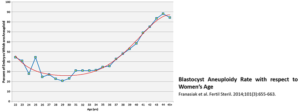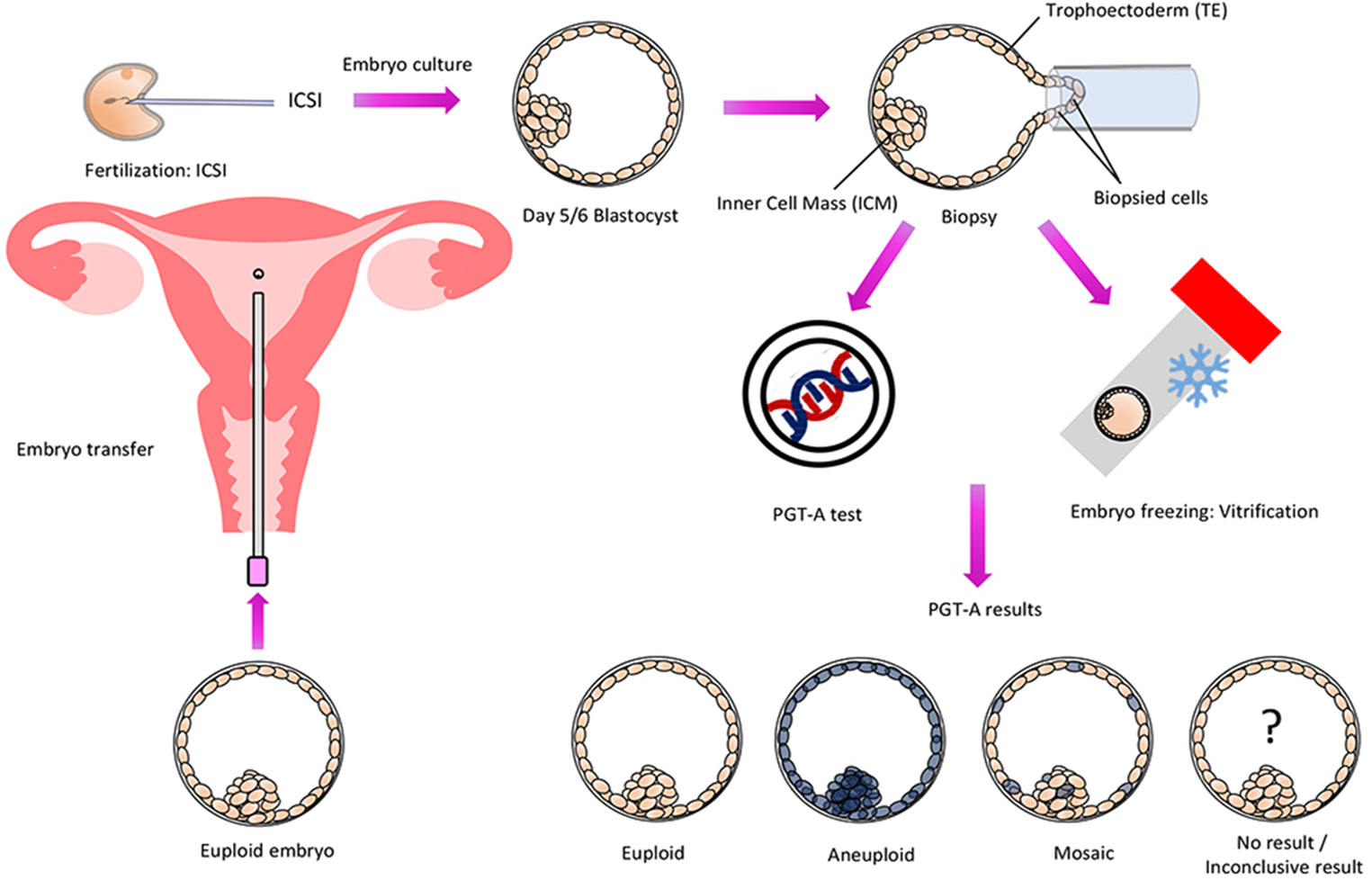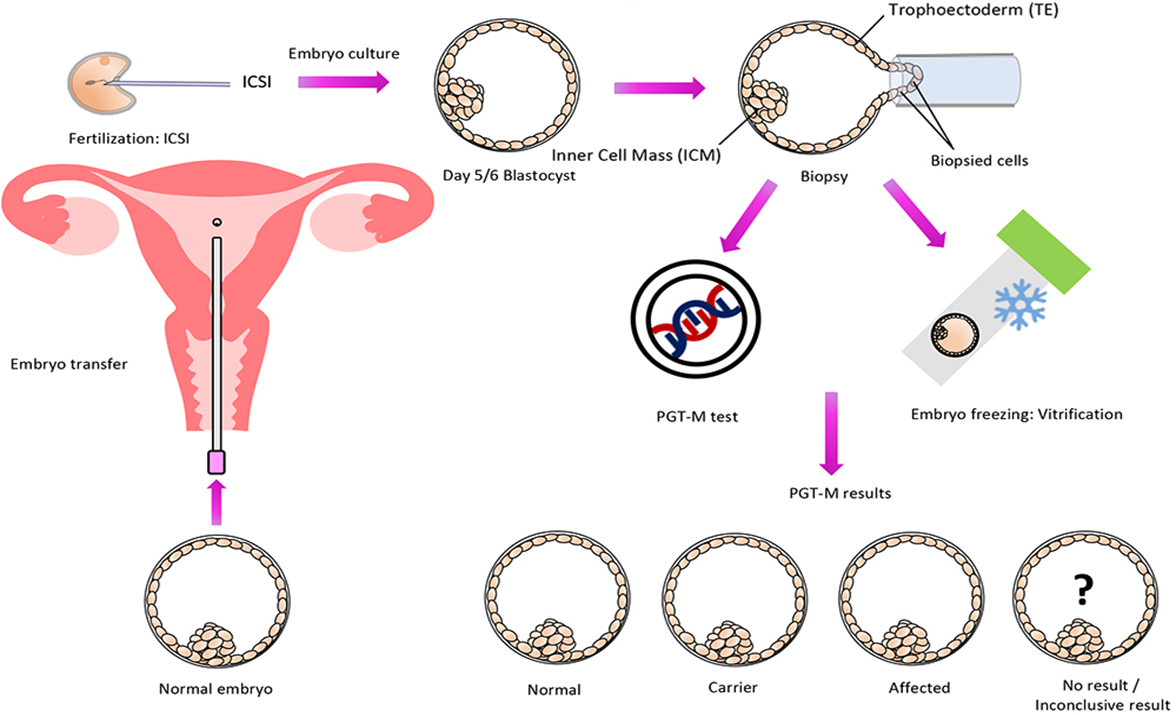Preimplantation Genetics
PGT - Preimplantation Genetic Testing
The goal of preimplantation genetic testing (PGT) is to genetically examine embryos before implantation into the uterus. Sampling is performed on embryos created during in vitro fertilization (IVF): 5-10 cells are taken from 5-6 day old embryos (blastocysts), which are then subjected to genetic analysis in the laboratory using next-generation sequencing.
PGT-A: Aneuploidy Testing
This method enables the detection of aneuploidy, i.e., changes in embryo chromosome number or microstructure. It helps select embryos with normal chromosome numbers, giving the best chance for successful implantation and healthy fetal development. PGT-A reduces the number of cycles needed for pregnancy and significantly reduces the chance of miscarriage.



Source: SART 2016
Understanding Chromosomes and Aneuploidy
Normal Chromosome Structure
- Healthy humans have two chromosome sets - 23 pairs each
- Total of 46 chromosomes
- One set inherited from mother, one from father
- X and Y chromosomes determine biological sex
- Female: 46,XX
- Male: 46,XY
- Embryos with correct chromosome number called euploid
Aneuploidy and Age Correlation
- Incorrect chromosome number increases with age
- Under 35: ~40% of embryos are aneuploid
- Over 40: >70% are aneuploid
- Explains lower IVF success in older women
- Higher miscarriage risk with maternal age
- Can appear normal in early development
- Often fail to implant or cause early miscarriage

PGT-A Process

Embryo Development & Biopsy
- Embryos cultured for 5-6 days to blastocyst stage
- Biopsy performed on well-developed embryos
- Few trophectoderm (TE) cells removed
- TE cells form placenta, not the fetus
- Inner cell mass (ICM) develops into fetus
- Over 100 TE cells available, removal doesn't harm embryo
Analysis & Transfer
- Embryos frozen immediately after biopsy
- Cells analyzed in PGT laboratory
- Results awaited before transfer decision
- Suitable (chromosomally normal) embryos identified
- Frozen embryo transfer (FET) in next cycle
- Improved pregnancy success rates
PGT-M: Monogenic Disorders
Single Gene Disorder Screening
PGT-M testing is used when one or both parents are known carriers of pathogenic gene variants. Examples include cystic fibrosis, hemophilia, and Huntington's disease. It enables selection of embryos that do not carry the specific genetic disorder, reducing the risk of inherited diseases.

Inheritance Patterns
- Autosomal dominant diseases
- Autosomal recessive diseases
- X-linked dominant diseases
- X-linked recessive diseases
- Y-linked diseases
- Comprehensive genetic counseling provided
Gene Location & Function
- Genes are basic units of genetic information
- Located on 23 chromosome pairs
- Chromosomes 1-22: autosomes (non-sex chromosomes)
- 23rd pair: sex chromosomes (XX female, XY male)
- Each gene has specific biological function
- Mutations can impair gene function
Additional PGT Options
PGT-SR: Structural Rearrangements
- Detects chromosomal imbalances from structural rearrangements
- Identifies missing or extra chromosome segments
- Screens for parental structural abnormalities
- Improves ART outcomes for carriers
- Reduces risk of implantation failure
- Prevents developmental disorders
PGT-HLA: Tissue Compatibility
- Selects HLA-compatible embryos
- Enables compatibility with existing siblings
- Facilitates future stem cell transplants
- Organ transplant compatibility
- Family-based treatment options
- Advanced tissue matching technology
PGT-P: Polygenic Risk Assessment
- Examines traits based on multiple gene interactions
- Assesses risk for complex diseases
- Cardiovascular disease risk evaluation
- Cancer susceptibility assessment
- Diabetes risk analysis
- Currently available on limited basis
Balanced Structural Rearrangements
- No genetic material loss or gain
- Translocations: material exchange between chromosomes
- Inversions: reversed chromosome segments
- Usually no health problems in carriers
- Higher risk of unbalanced embryos
- Can lead to infertility or miscarriage
Comprehensive Genetic Testing for Optimal Reproductive Outcomes
Our advanced genetic screening and PGT services provide essential information for family planning, enabling the selection of healthy embryos and reducing the risk of genetic disorders through cutting-edge reproductive technology.

